Imagine sipping on a glass of wine from the heart of the Israeli Negev Desert that transports you back fifteen hundred years, offering a taste that once delighted connoisseurs throughout the Mediterranean and beyond.
For the first time in the modern world, this experience is on the brink of becoming a reality as ancient grape varieties are miraculously revived in the Israeli Negev Desert. In the heart of Avdat National Park, a groundbreaking research-based heritage vineyard is breathing life back into vines that haven’t seen the light of day for centuries. This unprecedented venture not only resurrects flavours of a bygone era but also fortifies Negev’s identity as a wine region with deep historical roots and a one-of-a-kind tradition in desert viticulture.
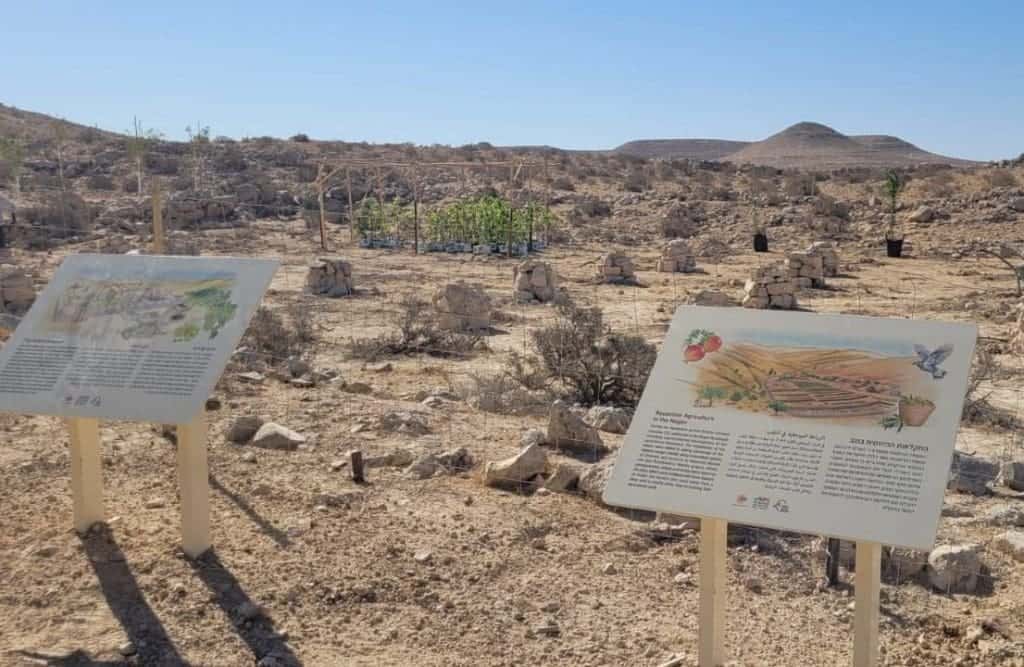
Image Credits: Israel Nature and Parks Authority INPA
How this historic event took place
A historic event took place in Avdat National Park, in the presence of the Minister of Environmental Protection, Idit Silman. In a global precedent, two ancient grape varieties were planted in the very vineyard where they were originally cultivated fifteen hundred years ago.
The vines were recovered from seeds found in archaeological excavations in Avdat and in groundbreaking DNA research led by Prof. Guy Bar-Oz from the University of Haifa and in collaboration with Dr Meriv Meiri from Tel Aviv University and researchers from the Israel Antiquities Authority.
The varieties are unique to the Negev Desert, from which the Negev wine was produced – a wine that gained a reputation throughout the Mediterranean and beyond during the first millennium A.D. The restoration of these ancient vines to the Negev further strengthens the identity of the Negev as a desert wine region with deep historical roots and a truly unique tradition of desert viticulture.
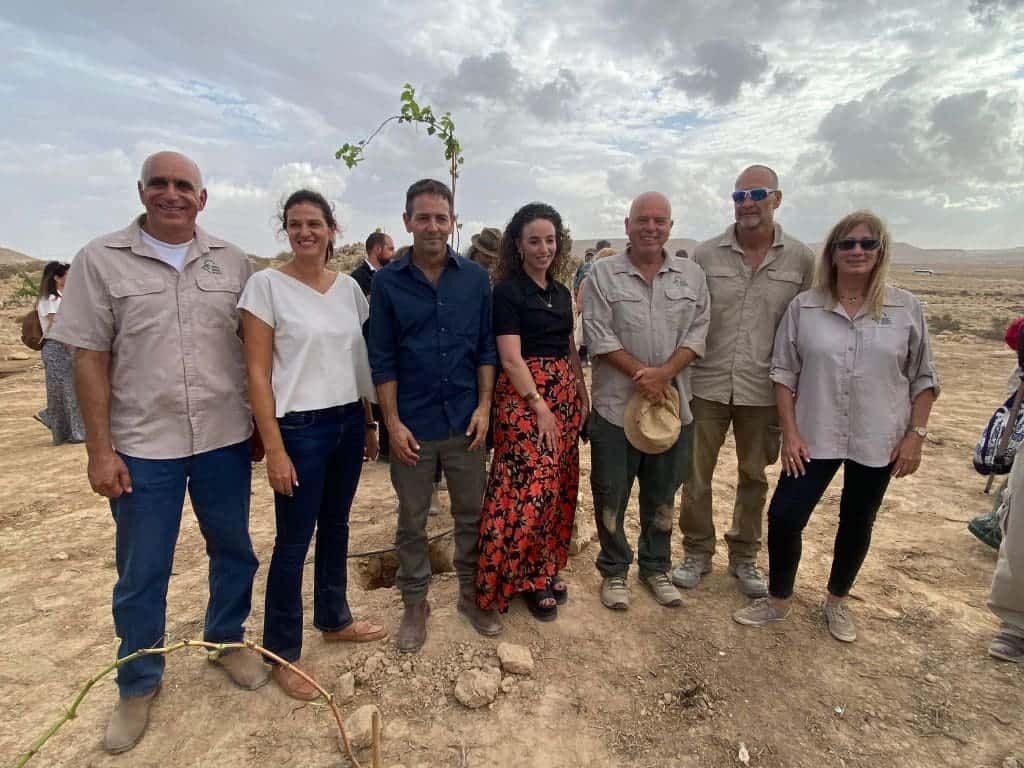
Image Credits: Dvorin Communications
The project is a collaboration between the Israel Nature and Parks Authority, the University of Haifa, the Israel Antiquities Authority, the Merage Israel Foundation, and the Ramat HaNegev Regional Council.
Avdat National Park, one of the main locations on the Negev Wine Route, is a UNESCO World Heritage site thanks to its role in the Nabataean Incense Route, but its wine heritage is just as impressive.
The city of Avdat used to be a major wine production and export centre in the ancient world. During the fourth through seventh centuries AD, the region was known as a source of quality wine throughout the Byzantine Empire, at a time when Christianity became the empire’s official religion. Wine from the Holyland was a thing to be had, and the Negev’s wine was exported as far as modern-day England.
The grape varieties discovered in the genetic research conducted on grape seeds discovered in the excavation in Avdat include two local varieties, Sariki and Beer, which are endemic to the Negev. The planting of the heritage vineyard along the park’s Winepress Trail includes the restoration of three vineyard plots near the five ancient winepresses that were uncovered at the site.
This heritage vineyard was established according to the traditional structure of vineyards that was common among the farmers of Israel during the Mishna and Talmud periods (1-7th centuries AD). The vineyard was adapted as a model of a historical-agricultural system based on studies implemented by Israeli agronomists and archaeologists during generations of pioneering research in the Negev.
The vineyard illustrates the principles of sustainability that characterize a desert vineyard, instils the historical story of Negev wines, and connects an ancient viticultural tradition with a pioneering modern wine industry in a way that strengthens the narrative of the Negev as an ancient wine region that has been resurrected in our time.
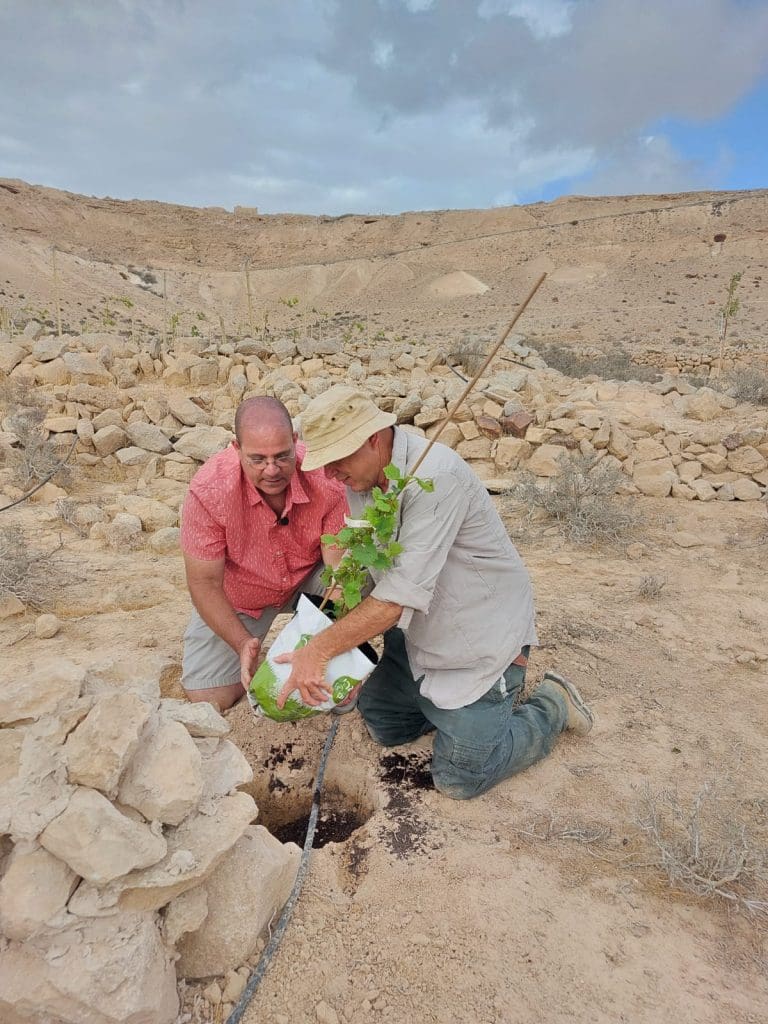
This project is an important addition to the region’s wine story, which has developed greatly in recent years, alongside the establishment of the Negev Wine Consortium by the Merage Israel Foundation – with over 40 wineries from the Northern Negev to Eilat as members. The consortium is a platform for cooperation, collaboration, and development between the wineries and vineyards and works to promote the Negev as a unique wine and tourism destination to visit.
The foundation is currently working with the Ministry of Justice to define the Negev as a wine region as an appellation with a Geographical Indication of Origin. The Negev is also expected to receive international recognition as a cultural wine route that merges the narratives of the historical wine route with the modern-day one, combining the ancient heritage of Negev wine and today’s pioneering wine industry.
Plans are set in place for the planting of the heritage varieties, Sariki and Beer, alongside the thousands of acres of commonly known varieties currently grown by members of the consortium, such as Chardonnay, Chenin Blanc, Sauvignon Blanc, Malbec, Merlot, Cabernet Sauvignon, and Petit Verdot.
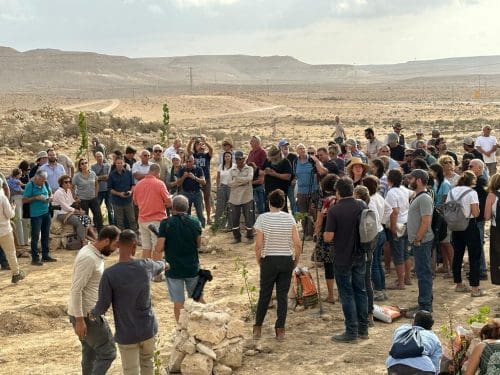
Image Credit: Ramat HaNegev Regional Council Shira Avrahami
The Minister of Environmental Protection, Idit Silman: “This is the story of the beautiful Land of Israel. The fact that a million liters of wine per year were produced in the desert and exported to the European continent 1500 years ago is both exciting and inspiring. Today we have the technological ability to plant ancient vines using ancient and modern methods in the desert, and its importance is emphasized in a time of climate change.
“Today, through Israeli knowledge, experience, and innovation, we can be an example to many countries facing climate challenges. This is the reason why the Ministry of Environmental Protection, together with the Merage Foundation and the Israel Institute for Innovation, leads the DeserTech innovation community that places Israel at the center of global sustainable solutions, opportunities, and economic development.
“It is a great privilege for me to be the Minister who heads the Nature and Parks Authority, and I am happy to see that this beautiful and ancient site, restored with great charm and hard work, provides the public with a unique glimpse into the ancient world, and to which masses of visitors will be exposed from the country and from around the world.”
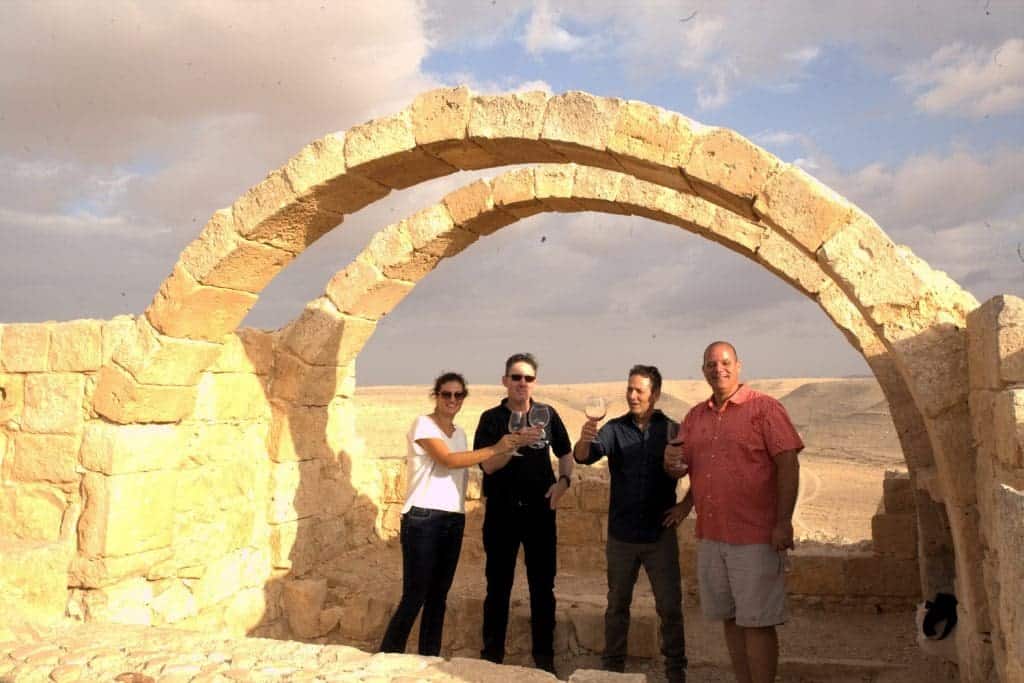
Image Credit: Zvika Tochterman
Eran Doron, Mayor of the Ramat HaNegev Regional Council: “I am excited about making Avdat’s Tuscan vision a reality, returning the crown to its former glory, renewing Avdat’s terraces with vineyards of the heritage varieties that grew here 1,500 years ago. Ramat HaNegev is at the forefront of agricultural research and development, including vines and wine production. We know how to produce quality wine in an arid climate and bring to the world groundbreaking solutions to the challenges of the wine industry in light of climate change. The planting of the traditional grape varieties deepens the historical agricultural connection in the Negev.”
Prof. Guy Bar Oz, University of Haifa: “The State of Israel is a pioneer on a global scale in the study of the desert. This research vineyard integrates the past, present, and future in the most practical sense, and embodies, in a tangible way, the specific weight inherent in sustainable agricultural development and its effect on local produce. Following the planting of these heritage vine varieties and the environmental attitudes towards their cultivation, the vineyard will help to showcase the conditions of ancient agricultural systems and will reveal the potential of human resourcefulness considering the limitations of an arid region, and the unique contribution of the desert to the characteristics of Negev wine grapes.
“Beyond the heritage value of Negev wine, past and present, we are convinced that in the increasing awareness of climate change, there is an inherent universal value in becoming closely acquainted with historical agricultural traditions adapted to desert conditions.”
Raya Shurki, Director General of the Israel Nature, and Parks Authority: “The planting of a vineyard in Avdat National Park is the best type of heritage project. It ignites the imagination and is pioneering in every aspect. I assume that the possibility of planting a ground-breaking heritage vineyard did not occur to David Ben-Gurion when he spoke about the vision of making the desert bloom, the return of the Negev, and its importance to the State of Israel.
“Today we are coming full circle after 1500 years. We thank our project partners – the Israel Antiquities Authority, the Merage Foundation, the University of Haifa, and the Ramat HaNegev Regional Council. The Nature and Parks Authority will continue to make heritage sites in Israel accessible to the public and tell the story of the Land of Israel in general and the unique story of the Negev in particular. We welcome visitors and encourage them to follow the paths of the past in the heart of the desert.”
Nicole Hod Stroh, CEO of the Merage Israel Foundation: “The Negev is becoming an international player in the field of wine – both in growing vines in the harsh conditions of the arid desert, and in producing excellent wine with unique characteristics. Several years ago, we recognized the potential that the region has in the Negev and decided to invest and establish the Negev Wine Consortium. We work on both local and international levels to promote the Negev as an international destination for wine tourism, as part of the Foundation’s activities for the development of the Negev.”
ABOUT TEL AVIV GLOBAL & TOURISM

Tel Aviv Global & Tourism is a municipal company under the Mayor’s Office. It facilitates the global quantum leap taken by the city of Tel Aviv-Yafo in creating economic and tourism growth. Sammy Yahia, Director of Tourism India and Philippines said, “Israel is a country with a rich cultural, historical, and religious heritage, and is home to a variety of attractions that offer something for everyone. Whether you are interested in history, culture, nature, or just looking for a unique experience, Israel is a destination that is sure to deliver”.
Read more: News



